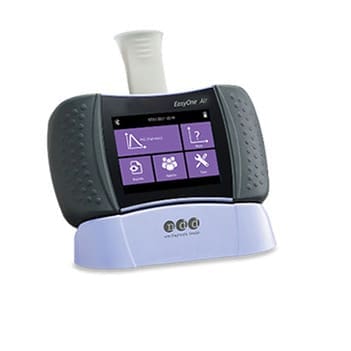Portable Spirometers Are Essential for DOT Medical Examiners
As a DOT medical examiner, having the right tools is essential for accurately assessing the health and fitness of commercial drivers. While many necessary tools may already be part of your practice, there are others—such as portable spirometers—that can provide valuable insights during a DOT physical exam. These compact devices play a crucial role in evaluating respiratory health, which is vital for understanding the overall fitness of a driver.
What is a Spirometer?
A spirometer is a medical device used to measure how much air an individual can inhale and exhale, providing essential information about lung function. Since our lungs facilitate the exchange of carbon dioxide and oxygen, the efficiency of this process is a key indicator of respiratory health. Healthy lungs ensure the effective delivery of oxygen to the heart, muscles, and brain, supporting daily tasks and overall well-being. When lung function is compromised, whether by obstruction, scarring, or other dysfunctions, patients may experience fatigue, dizziness, shortness of breath, or even fainting.
Spirometry is a valuable diagnostic tool for identifying and monitoring various lung conditions, including asthma, chronic obstructive pulmonary disease (COPD), pulmonary fibrosis, and emphysema. It also helps track the progress of treatments for these conditions.
How Does a Portable Spirometer Benefit Your Patients?
While referring patients to a hospital for spirometry tests is an option, having a portable spirometer in your office offers several advantages for both your patients and your practice:
- Convenience: For patients who would otherwise need to travel to a distant hospital for testing, a portable spirometer in your office saves valuable time and travel costs.
- Cost-Effectiveness: Patients may incur lost wages or vacation time when traveling to a hospital for testing. Additionally, there could be copayments for the visit and procedure. By offering spirometry tests in-house, you help patients avoid these extra expenses.
- Time Efficiency: Hospitals are often busy environments, and scheduling spirometry tests can be a lengthy process. The timeline typically involves several steps, such as appointment scheduling, insurance clearance, test administration, data analysis, and follow-up appointments to discuss results. In contrast, a portable spirometer allows you to complete the necessary testing promptly during the DOT physical exam, eliminating unnecessary delays.
- Health Considerations: Hospitals treat a wide range of patients with serious conditions, increasing the risk of exposure to infectious diseases. Patients, especially those with compromised lung function or weakened immune systems, may hesitate to seek treatment in a hospital setting. In contrast, a clinic or doctor’s office typically has a lower patient density and lower risk of infection.
Benefits for Your Practice
Incorporating a portable spirometer into your office not only enhances patient care but also offers several operational benefits:
- Faster DOT Exams: Commercial drivers depend on timely DOT physicals to maintain their employment. Having a portable spirometer in your office expedites the exam process, enabling you to provide necessary results faster, allowing drivers to get back on the road.
- Enhanced Revenue: By offering spirometry testing in-house, you can generate additional revenue, rather than outsourcing the service to a hospital or specialist.
- Improved Patient Care: Shortness of breath can be distressing, and timely diagnosis is critical for patient comfort and safety. With a portable spirometer, you can quickly assess lung function and begin treatment without waiting weeks for external test results.
Does the Spirometer Require Specialized Training?
While performing spirometry during a DOT physical does not require specific training, manufacturers of spirometers often provide instructional materials to ensure correct usage. In some cases, certain work environments require specific NIOSH-approved training for those using spirometers. These include conditions involving:
- Cotton dust
- Respirable coal mine dust
- Respirable crystalline silica
For optimal results, it is crucial to follow proper testing procedures. Understanding how to interpret the data accurately ensures that you can provide the best care for your patients.
Tips for Accurate Spirometry Testing:
- Good Posture: Ensure the patient sits up straight with proper back support to maximize lung capacity. Poor posture can lead to inaccurate results.
- Rest Between Tests: Allow at least one minute between tests to ensure the patient recovers and avoids fatigue, which can skew results.
- Proper Test Procedure: Have the patient use a nose plug to prevent air from escaping. Instruct the patient to inhale deeply, hold their breath for a second, then exhale forcefully into the spirometer for at least six seconds.
- Consistency: To ensure accurate results, perform two tests with consistent readings. Multiple factors can affect the results, so consistency is key to an accurate diagnosis.
When is a Spirometry Test Contraindicated?
While spirometry is a highly effective tool, there are situations where it may not be appropriate to conduct the test in your office. Contraindications include:
- Respiratory infections
- Pulmonary embolism
- Recent pneumothorax (collapsed lung)
- Recent surgery
- Intracranial hypertension
- Inability to follow instructions due to age, dementia, or cognitive impairments
Expanding Your Testing Capabilities
Incorporating a portable spirometer into your practice offers a cost-effective way to expand your testing capabilities and improve patient care during DOT physicals. Not only does it provide valuable insight into your patients’ respiratory health, but it also offers convenience and savings for both your patients and your practice. By enhancing the efficiency and scope of your services, you can attract more commercial drivers and grow your practice while maintaining a high level of patient satisfaction.


